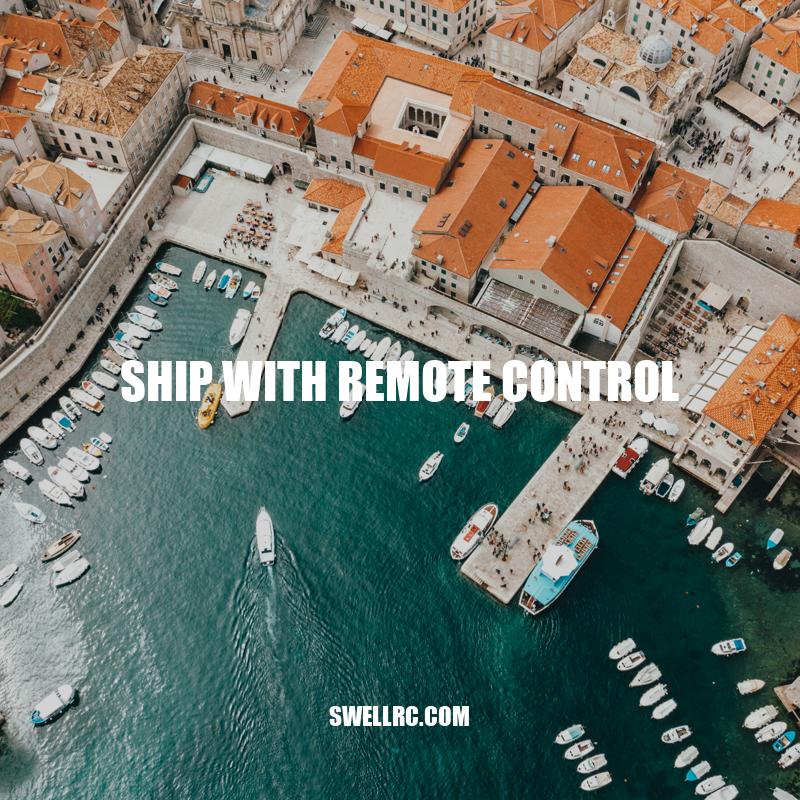Exploring the Uses and Benefits of Remote-Controlled Ships
A ship with remote control is a technological breakthrough that has been used in different industries to maximize efficiency, convenience and reduce the risks that crewed vessels face. The development of remote technologies has enabled the creation of safe, dependable and cost-effective unmanned ships that can be controlled from a distance using advanced hardware and software. Remote control ships have become increasingly popular in surveying, patrolling, and inspection activities, among other applications. The vessel can operate autonomously and is equipped with sensors and cameras to enable accurate navigation and data collection. Remote-controlled ships are usually powered by electric motors that enable them to run silently and save energy, while their compact designs allow them to operate in tight spaces, making them ideal for different tasks. The vessels’ operational range can be extended by using satellite communication systems that enable real-time monitoring and control, thus allowing the crew to operate the ships remotely without the need for onboard personnel. The advanced technology behind remote control ships has opened up new opportunities in different industries and deepened our understanding of water transportation and safety.
Applications of Remote Control Ships: Uncovering a New World of Possibilities
Remote-controlled ships have numerous practical applications across industries. The following are some of the ways remote control ships are utilized:
- Disaster Management and Search & Rescue Operations
- Marine Research and Exploration
- Oil and Gas Exploration
- Ocean and Marine Life Monitoring
- Military Applications
In case of a natural disaster, such as a flood or a hurricane, it is difficult to navigate through debris to reach stranded people. Remote-controlled boats have become a valuable asset in search and rescue operations, providing swift assistance and swift search without the risk of human lives involved.
The ships are also commonly used in conducting marine research and exploration missions. They can collect comprehensive data concerning oceanic features or study underwater organisms. The deployment of remote control ships in oil and gas exploration helps in detecting and uprooting corrosion in onshore and offshore equipment and also assist with aquatic life preservation.
In conclusion, with the recent advancement in remote-control technology, companies can now leverage autonomous shipping to increase productivity and reduce costs while minimizing risks that have always been associated with manned vessels. Remote-operated ships have proven to be the future of data gathering, research, and marine discoveries. To learn more about the benefits of remote control ships and where to find high-quality remote-controlled ships or products, visit our website.
What are the benefits of having a remote control system in the maritime industries?
The use of remote control systems in the maritime industries offers significant benefits such as improved safety, increased efficiency, and reduced operational costs. Autonomous and remote-controlled water vessels have the potential to revolutionize the maritime industry. For more information on remote control systems for water vessels, you can visit the websites of companies such as Rolls-Royce and Kongsberg.
Remote-controlled ships offer a range of benefits over traditional manned vessels. Below are some advantages of using remote control ships:
| Advantages of Remote Controlled Ships | Description |
|---|---|
| Increased efficiency | Autonomous shipping means there is no need for crew of ships which reduces costs and eliminates human errors |
| Improved safety | Removing crew from hazardous conditions, remote control ships lower the risk of injuries and loss of human life |
| Better accuracy and reliability | With enhanced precision and real-time data, remote control ships can collect more comprehensive data compared to manned vessels |
| Environmental benefits | Remote control ships driven by electric motors reduce greenhouse gas emissions and air pollution |
| Flexibility in operations | Remote control ships can be operated in a variety of weather conditions and inaccessible waterways, increasing capabilities and capacity |
Moreover, remote control ships are highly adaptable and customizable, allowing for specific designs depending on the nature of the tasks they have been assigned. Some of the notable benefits of remote-controlled ships that aren’t in the table include that they cannot fall victim to fatigue, resulting in better work performance due to their non-stop availability.
In addition, remote-controlled ships are fast becoming a popular way to transport goods worldwide, especially in the maritime logistics industry, which was among the earliest to adopt this approach. These unmanned vessels ensure the safe and efficient delivery of goods worldwide at a reduced cost.
If you want to learn more about remote-controlled ships and their advantages, visit our website for products, information, and reviews.
What are the advantages of unmanned ships?
Unmanned ships, or autonomous ships, come with multiple advantages. One major advantage is enhanced security against piracy as these ships can be equipped with advanced security systems and can be remotely monitored and controlled. Another benefit is their ability to operate in extreme weather conditions as they can be designed to withstand heavy seas and other challenging environmental conditions. Autonomous cargo ships, also known as autonomous container ships or maritime autonomous surface ships (MASS), are crewless vessels that transport either containers or bulk cargo over navigable waters with little or no human interaction. For more information on autonomous ships, visit the website of the International Maritime Organization.
Conclusion
In summary, remote control ship technology is shaping up how vessels and their tasks can be executed. Remote-controlled ships provide an affordable and safe option for a different range of functions. Their increased efficiency, enhanced safety, precision, and customizability make them highly sought after in different industries. Notably, there is a vast innovation pipeline to exploit the opportunities that come with this technology, such as automation, machine learning, and artificial intelligence. Remote control ships are undoubtedly the future of marine technology and will dictate how shipping will look like soon.
In conclusion, as technology advances, autonomous shipping is expected to take up a more significant share of global cargo transportation, promoting sustainability and safety in the water transportation sector. The future looks bright for remote-controlled ships, with continuous development and technological investment to make them even better. If you are considering purchasing a remote-controlled ship, ensure you evaluate their particular features to match their intended use-case.



